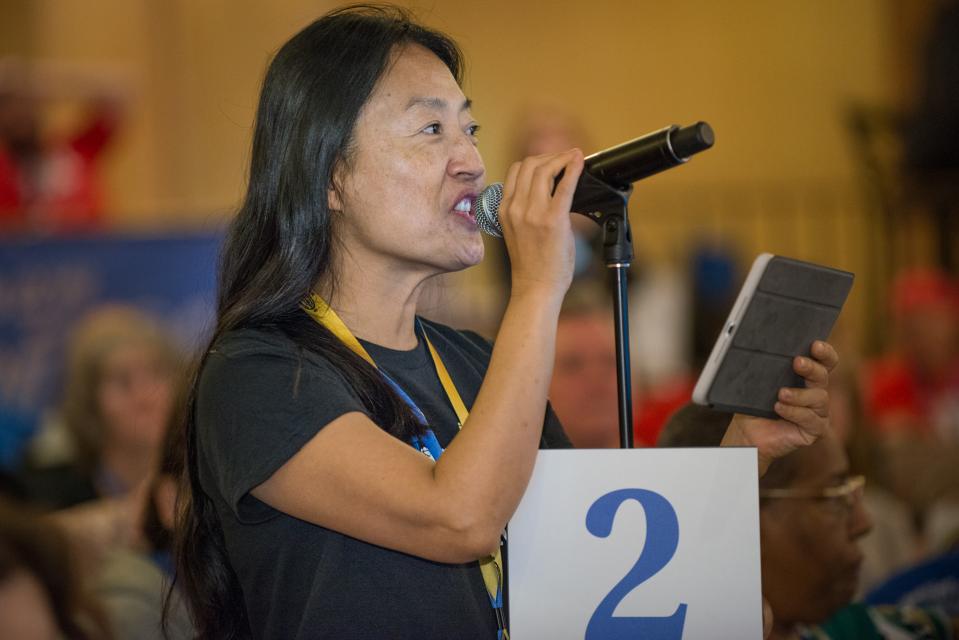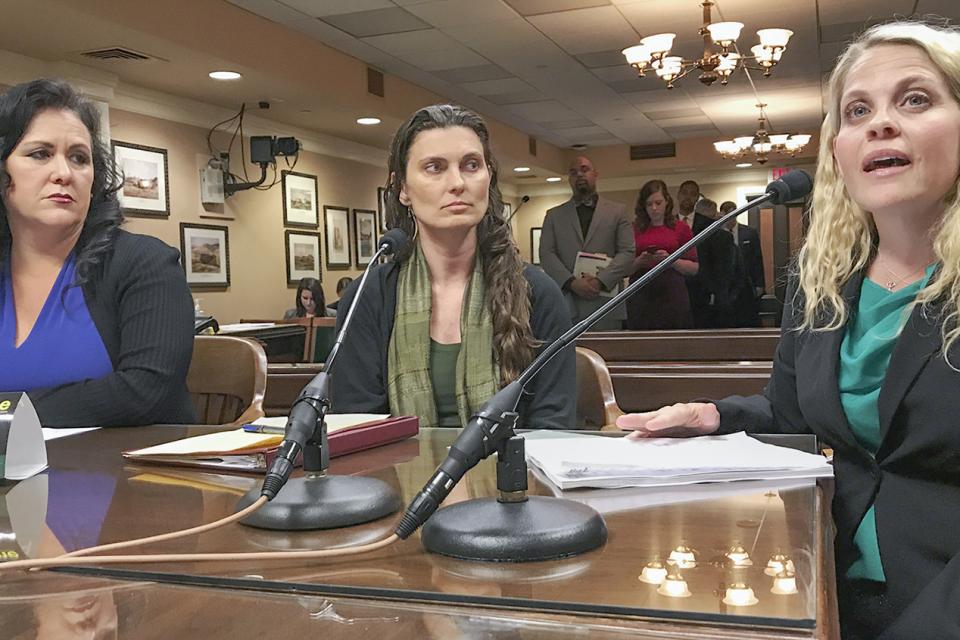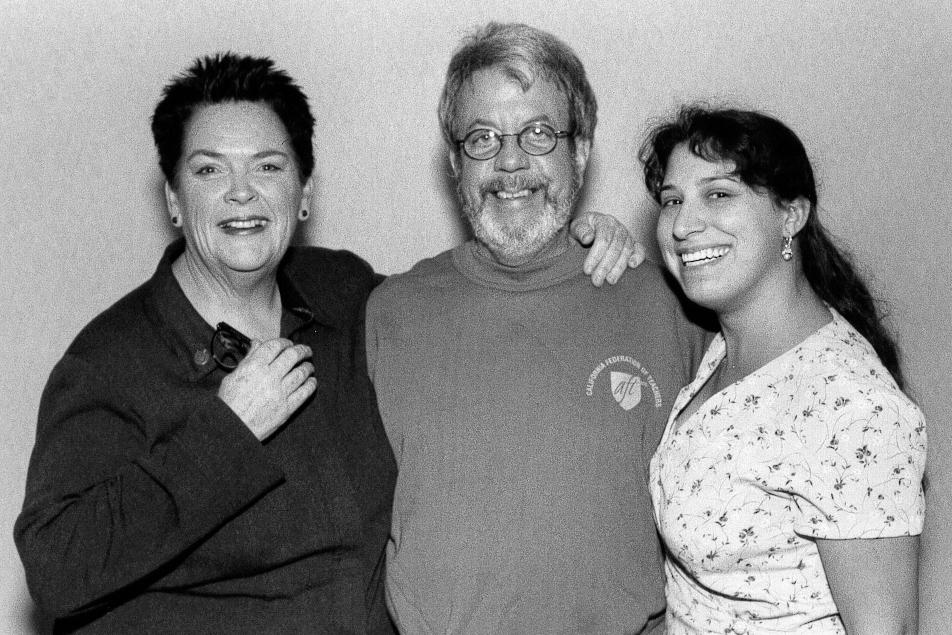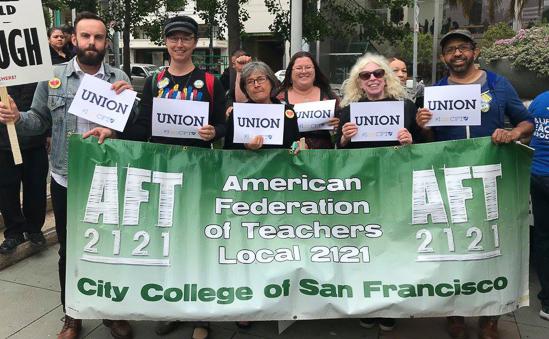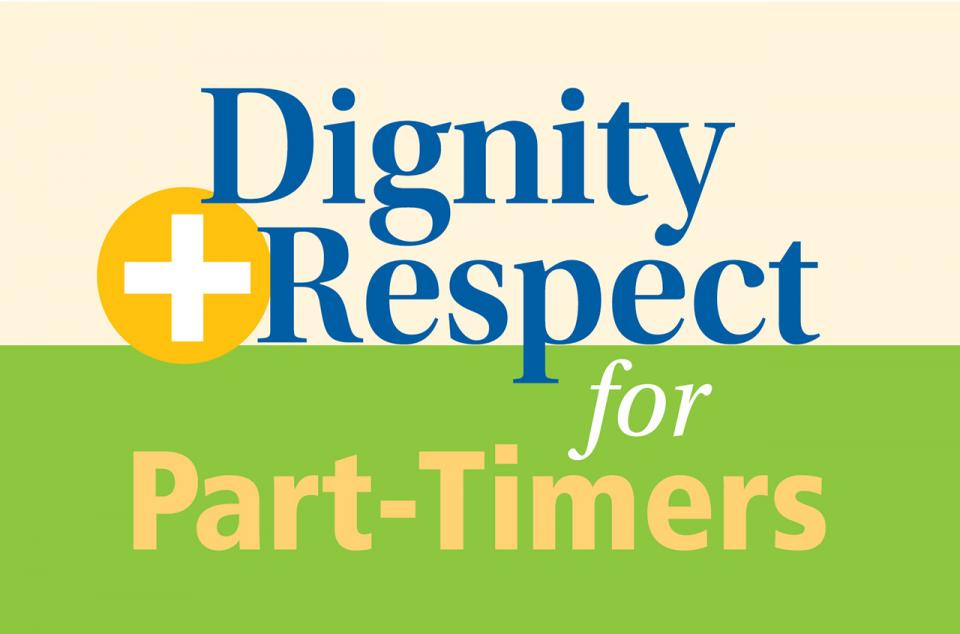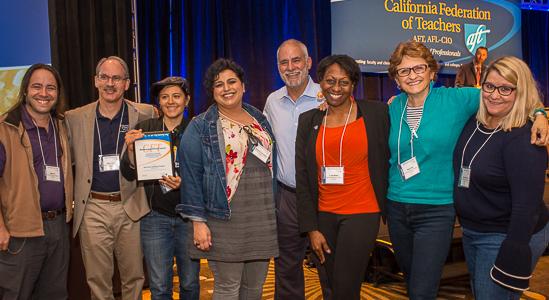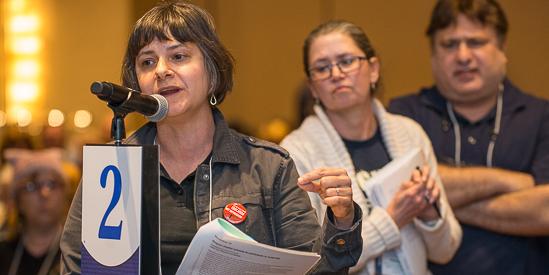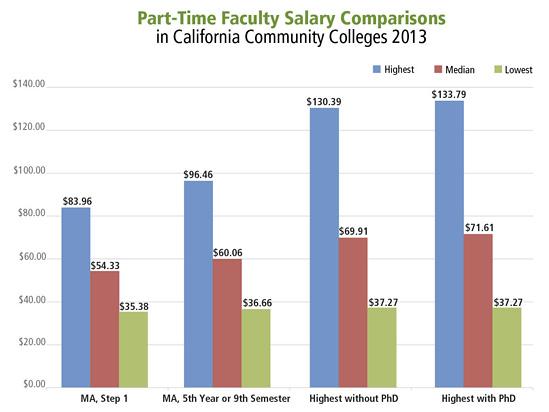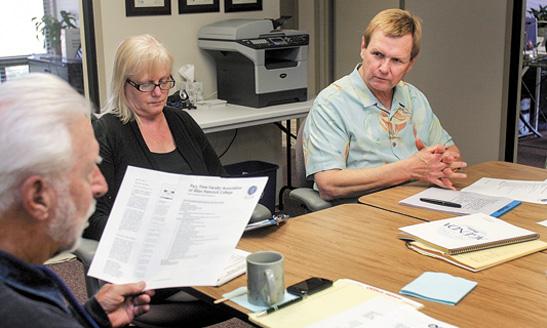Delegates reaffirm support for part-time faculty voice in shared governance
While the issues of pay inequity, the lack of job security, and access to health benefits are major challenges that plague part-time faculty —collegiality, inclusion, and connection with their campuses and fellow faculty are also important for a part-time faculty member’s long-term involvement with a particular institution.
Key to increasing adjunct involvement and connection in the California community colleges is increasing both the opportunities for and compensation of part-time faculty participation in shared governance.
Paid maternity leave: AB 500 empowers female educators, staff and their families
Pregnancy is a medical condition that requires women to take time off either to deal with the pregnancy itself and potential complications, to recover from child birthing, or bond with a child, which often requires far more than a just the few weeks that many female adjuncts may have in accumulated sick leave. It is not an illness, like a cold, nor a disability like throwing out your back. It is a temporary disability specific to women and needs to be treated as such.
Freeway Flyers: Local action & quick news
Contract gains and remembering Sam Russo
Union mourns the passing of activist Sam Russo
Sam Russo, one of the core group who organized Adjunct Faculty United, AFT Local 6106, died on May 5. He was president of the local for 12 years, and served on the negotiations team for a number of years.
Student loan forgiveness: Bill aims to help part-time faculty in California
AFT wants to hear from those denied application
Update: The governor signed AB 463 into law on October 4, 2019.
Presently working its way through the Assembly, AB 463, Cervantes, D-Riverside, seeks to make it easier for California part-time community college instructors to gain eligibility for the federal Public Service Loan Forgiveness program.
Letters to the Editor
The real effort should be pay equity at the state level
I have taught part-time music at Cabrillo College for 31 years at the maximum number of units. I am a bit dismayed about the 80 percent cap (Convention votes to raise part-time workload cap to 80 percent, Spring 2018) because that means that the colleges can now cover more classes with underpaid part-timers.
This means fewer full-time jobs, which will make everything (committee work, student contact hours outside of the classroom, etc.) more difficult for the teaching staffs. I understand that the extra work is a godsend for many part-timers but the real effort should be pay equity at the state level, not the local level.
Freeway Flyers: Local action & quick news
Yuba adjunct wins President’s Award, Fresno adjunct wins Hayward Award
This spring, Neelam Canto-Lugo, an adjunct professor of communications at Yuba College in Marysville, and member of the Yuba College Federation of Teachers, AFT Local 4952, was awarded the gold-level President’s Volunteer Service Award for her work in poorer communities of Bangladesh, Nigeria, and Nepal, among other countries.
AFT resolution supports $7,000 per three-credit course for adjuncts
One of the more talked about resolutions passed by the biennial AFT Convention this July was Resolution 15, which calls for AFT to support City University of New York adjuncts in their quest to achieve through “actions, demonstrations, and advocacy,” a minimum of $7,000 per three-credit class.
The resolution, which passed with resounding support and no opposition, also supports this minimum in “all other AFT locals’ campaigns for fair adjunct pay.”
State Council resolution reiterates support for statewide health insurance for part-timers
On May 5, the State Council approved a resolution put forth by the CFT Part-Time Committee, calling for CFT to sponsor legislation “to establish a permanent healthcare program for part-time faculty and their dependents.”
Cerritos Faculty Federation takes a stand for healthcare
Cerritos faculty are taking a stand for equity.
“Right now our college doesn’t provide any sort of health benefit to part-timers,” explained local President Stephanie Rosenblatt. “Most of the districts around us provide at least some sort of reimbursement scheme, in which part-time faculty are reimbursed at even a minimal level for their healthcare premiums.”
CFT’s efforts yield parental leave, more full-time positions, paid office hours, pay equity
If there were perhaps one way to describe the legislative campaign waged by CFT this year as it regards both part-timers and the community college system, one could say it was “spirited.” Despite the sea changes proposed for the entire system, the union still won improvements for part-timers.
Part-timers are still sticking with their union
On June 27, the storm clouds were gathering. The Janus v. ASFCME decision had just come down from the U.S. Supreme Court in a 5-4 ruling, overturning 40 years of legal precedent and marking the abrupt end of union fair share, or agency fee, for public employees.
Now non-union members who benefit from the hard work of unions who still represent them at the bargaining table would no longer be required to pay their fair share.
Plan your local campaign now for Campus Equity Week
The month of October is once again time to give special attention to part-time faculty issues. Officially, Campus Equity Week is the week of October 22-26, but what’s more important is that campus communities get the word out this fall before the legislative process begins.
Oppose creation of unnecessary, fully online college
All of California’s 114 community colleges offer online courses, so why do we need a fully online 115th college, especially a non-union one which would hire adjuncts to work for even lower wages, without union protections?
The $120 million the governor is budgeting for this college could be better spent on increasing full-time positions, part-time pay equity, and more paid part-time office hours.
Support paid office hours for part-time faculty
Send a letter to Gov. Brown asking that more money be put in the State Part-time Office Hours Fund. These letters work. A similar campaign last year helped secure a $5 million increase in the fund, an increase of over 70 percent. That said, the state fund only matches about 10 percent of paid part-time office hours funds, which is why office hours funding is either limited or non-existent in most districts.
Los Rios wins top award for its Part-Timer’s Almanac
There are adjunct survival guides out there which give basic union info, and perhaps maybe where the copy machines are located on campus, then there’s The Part-Timer’s Almanac, A Compendium of Valuable Information, which is perhaps the most comprehensive, adjunct-oriented union publication published by a local union.
Yes, Virginia, adjuncts can get unemployment benefits
Even if you have received a tentative offer of employment for the next semester, you are entitled to apply for unemployment benefits over the break immediately upon completion of your last working day of the semester.
Adjunct instructors are considered at-will employees, because despite the “tentative assignment offer” one may receive, this is not legally considered a “reasonable assurance of employment.”
Membership drives in the community colleges mean more adjunct power
The forthcoming Supreme Court ruling in Janus vs. AFSCME poses a serious threat to union strength. Any union is only as strong as its membership base, and when unions have higher percentages of the workers in its unit as active members, they are stronger at the bargaining table, and better able to protect its workers from violations of their rights.
Part-timer health benefits: The successes and challenges ahead
Among the many challenges that part-time, or contingent faculty face, health care benefits, or rather, the lack thereof, has been one of the most significant.
According to Bloomberg, healthcare is the leading cause of bankruptcy in the United States, and in spite of the passage of the Affordable Care Act, aka Obamacare, in March 2010, the number of bankruptcies attributed to healthcare costs tripled in 2017, while the general rate of bankruptcies fell overall.
Convention votes to raise part-time workload cap to 80 percent
At this year’s CFT Convention, delegates passed Resolution 15 calling for the CFT to support changing the workload cap in a community college district to 80 percent of a full-time equivalent load, effectively allowing part-time faculty to teach up to 12 units.
New law brings reemployment rights for part-time faculty
Successful CFT-sponsored legislation calls for districts to negotiate
Community college districts will soon be compelled to negotiate what CFT-sponsored legislation calls “reemployment preference for part-time, temporary faculty.” The landmark provisions require districts to negotiate with the union in order to receive significant funding available from the state Student Success and Support Program.
Freeway Flyers: Local action & quick news
New study explores sociology adjunct working conditions
As the only part-time faculty member of an American Sociological Association taskforce assembled to investigate the teaching of sociology within community colleges, Peralta Federation of Teachers member and Laney College instructor Cynthia Mahabir co-authored a scholarly study of data collected from part-time sociology instructors in the nation’s community colleges.
Falling enrollment, cancelled classes, and part-time faculty
FIRST PERSON | Renee Fraser
Many of us have been teaching in community college for 20 years or more, and we remember the days when the mission was education, not production. Classes might have 25 or 30 students, so we could have seminar-style discussions and individual project presentations, and even memorize the names of our students. We might assign lengthy papers and essays, and we had time to read each one, make comments, and allow students to rewrite them.
Campus Equity Week can build adjunct-student solidarity
October 24-28 is Campus Equity Week
Most part-time instructors are aware of how damaging adjunct working conditions can be to our lives economically, physically, emotionally, and psychologically. You may also be aware of how these working conditions can hurt students, the institutions, and tenure-track, full-time employees as well.
But how aware are students?
Historic victory: New law brings reemployment rights for part-time faculty
Governor signs CFT-sponsored bills calling for districts to negotiate with unions
Community college districts will be compelled to negotiate what CFT-sponsored legislation calls “reemployment preference for part-time, temporary faculty.” The landmark provisions require districts to negotiate with the union in order to receive significant funding available from the state Student Success and Support Program.
Freeway Flyers: Local action & quick news
Campus Equity Week draws attention to inequities among faculty in higher education and calls for economic justice, job security, and institutional support for contingent and part-time faculty. Originally organized by the Coalition of Contingent Academic Labor, these October events aim to bring greater awareness to the precarious situation for contingent faculty in higher education, organize for action, and build solidarity.
Will you be eligible for unemployment this summer?
By Grace Chee
At the end of each semester or academic term, full-time faculty go on break, while adjunct faculty become unemployed or underemployed — still working and making less than $600 per week — until the next semester or term starts.
During these periods, you may be eligible to receive unemployment insurance benefits of up to $450 a week, for up to 26 weeks per year in California.
One conversation at a time: Part-time faculty join the union in record numbers
By Linda Sneed
As a CFT vice president and representative of part-time faculty in my district, I’m pleased by the efforts made by my local union and the CFT to strengthen member engagement and outreach. The CFT “Building Our Power” campaign is helping locals do a better job of not only sharing information with bargaining unit members but seeking their input.
Do you know what to do during a campus emergency?
Part-time faculty identify needs for further training and information
How much do you know about maintaining a safe and secure environmentwhere you teach? If you don’t know your campus’ safety and security protocols and expectations of faculty in emergencies, do you know where to find them?
Soon after an isolated incident at Sacramento City College in September that left one person dead and another hospitalized, part-time Sociology instructor Angelo Williams began thinking about campus safety, what he needed to know, and how to support students in the wake of the event.
Former part-timer chairs Assembly Higher Education Committee
Teaching background brings understanding, nuanced solutions
Community College Council President Jim Mahler says having Assemblyman Jose Medina as the new chair of the Committee on Higher Education is a gold mine.
Why? Because Medina, before going into politics, was a high school teacher in the Riverside Unified School District and a part-time teacher at three different community colleges, active in his union. He knows first-hand the insecurity part-timers have to deal with — cobbling together a schedule, finding enough work to support themselves, and worrying about their classes being cancelled.
One by one: Organizing team signs up part-time faculty
Why does anyone join the union? …because someone asks them
Member organizers from local unions throughout the state joined forces at Palomar College to meet one-on-one with part-time faculty agency fee payers who had not yet signed their union cards — and asked them to join the union.
Freeway Flyers: Local action & quick news
Santa Maria part-timers negotiate numerous improvements
Part-time instructors at Allan Hancock College negotiated an 8 percent pay increase over the next two years starting this spring when all part-time academic employees received a 4 percent salary increase. They will get a 2 percent raise this fall and another in fall 2016. In a tremendous boost, service faculty (counselors, librarians, and nurses) received an additional 20 percent pay increase.
New CFT bills create minimum job security standards, strengthen the 75:25 regulation
Job security and due
process for part-time faculty
AB 1010 (Medina, D-Riverside)
This bill calls for the establishment of minimum standards for part-time faculty job security. If enacted, it would require all California community colleges without a collectively bargained contract that provides equivalent or stronger job security and due process rights to establish a seniority list for part-time faculty rehire.
Loan forgiveness program may bring relief
Last year, Sen. Dick Durbin (D-Illinois) made headlines with his “Adjunct Faculty Loan Fairness Act,” a bill that would have made it much easier for part-time faculty to benefit from the federal Public Service Loan Forgiveness program, designed to encourage graduates to pursue a career in public service by offering loan forgiveness for those working full-time in government or the non-profit sector.
Paying for time but not for space: The need for a “room of one’s own” on campus
FIRST PERSON | Linda Sneed
We all know that our work takes place not just during scheduled class meetings, in classrooms on college campuses. We work in many times and places: early in the morning, through mealtimes, and late at night; in our cars, on public transportation, on our phones and personal computers, at home, in coffee shops, in public libraries.
Lessons learned: Wronged Peralta part-time instructors rehired
Sociology instructor Cynthia Mahabir is back in the classroom. What did it take to get her there, after her district mysteriously refused to honor its contract with faculty and rehire her after 17 years of teaching at Laney College?
National Adjunct demonstrations sweep the country
Precarious employment issue re-emerges in national spotlight
National Adjunct Walkout Day began at UC Santa Cruz with lecturers lined up behind the large puppet of “Saint Precaria.” They then walked through the wooded campus to the amused response of students.
Freeway Flyers: Local action & quick news
ACCJC has taken part-time jobs from San Francisco
With City College of San Francisco still in limbo status due to unfair sanctions from the Accrediting Commission for Junior and Community Colleges, nearly 150 part-time faculty have lost their jobs in the past couple of years and few, if any, part-time counselors have been rehired.
AFT Convention forms Part-Time Caucus
Part-time and contingent faculty throughout the United States now have a stronger voice in our national union with the formation of a Part-Time Caucus at the AFT Convention in July.
Several California part-timers are helping shape this tool to influence AFT priorities and connect part-timers nationwide.
Two new laws will benefit part-time faculty in California
Improved transfer of unused sick leave
Assembly Bill 2295 (Ridley-Thomas, D-Los Angeles) makes it easier for part-timers to transfer unused sick leave from a previous community college employer to a new one by extending the transfer period from a mere one year to three academic years.
CalSTRS offers more assistance with service credit reporting
By Sharon Hendricks, Los Angeles College Faculty Guild and CalSTRS Board Member
To help part-time faculty understand how districts report service credit and to ensure they receive all service credit they have earned throughout their teaching careers when they retire, CalSTRS has opened new centers in Irvine, Glendale, and Santa Clara, staffed by benefits counselors trained to navigate part-time-faculty issues.
Join CFT campaign for office hours pay, full-time positions
How can we get more state funding for office hours, equal pay for equal work, and new full-time positions that that will benefit existing part-time faculty? CFT is calling on part-timers and their allies to urge the governor to include line items in the state budget dedicated to these essential improvements.
Advocate for our interests in providing equal education opportunities for students by writing directly to Gov. Brown and others who influence the state budget. Ask the governor and the Department of Finance for these new resources:
Rehire rights: Long-time instructor describes pain of losing assignment
Outpouring of faculty and student support
What happens when your employer disregards your contractually negotiated rehire rights? Part-time instructors at Oakland’s Laney College recently found out. One of them is Cynthia Mahabir, a sociology instructor and Part-Time Representative on the executive board of the Peralta Federation of Teachers.
Freeway Flyers: Local action & quick news
- AFT Guild successfully negotiated for continuing education part-time faculty in the San Diego community colleges to be on the same salary schedule as credit-course instructors, and in the Grossmont-Cuyamaca district for part-timers teaching 50 percent of a full load to be eligible for fully district-paid healthcare coverage starting January 2015.
Part-time-friendly resolutions passed at CFT Convention
At the CFT Convention in March, the full body of delegates passed three important resolutions that affect part-time faculty.
More part-time faculty choose AFT/CFT as their union
Non-credit faculty at Citrus College, Grossmont-Cuyamaca Colleges join locals
Faculty teaching non-credit courses at both Citrus College and the Grossmont-Cuyamaca Colleges have chosen AFT as their union. Non-credit hourly part-time faculty at Citrus and continuing education part-time faculty at Grossmont-Cuyamaca had been paid significantly less than their colleagues teaching for-credit courses.
Now the faculty have union representation, are on salary schedules with opportunities for schedule advancement, and can accrue sick leave.
What does the Affordable Care Act really mean for part-time faculty?
The Affordable Care Act has made it possible for some previously uninsured part-time faculty to get healthcare coverage. For others, coverage has become more affordable. Available subsidies, along with customizable combinations of premiums and deductibles, may make going on the exchange worthwhile.
When do you qualify for unemployment benefits?
If you are teaching summer school, you may qualify for unemployment benefits in the periods before or after summer session. If you do not have a summer or fall teaching assignment, or another job, you may be entitled to unemployment benefits.
This results from a 1989 legal challenge brought by the CFT in the landmark case Cervisi v. California Unemployment Insurance Appeals Board.
Ancillary pay programs: New strategies for part-timer inclusion on campus
Parity pay — compensation for part-time faculty commensurate with that of our full-time colleagues for comparable work — is one of the defining goals of the movement for part-timer equity. Progress continues to be made, but in lean budgetary times salary schedule advancements may be more difficult to negotiate.
How does your pay rate compare to others?
CFT releases comprehensive salary survey of part-time faculty
Have you ever wondered how your pay rate compares to that of other part-time faculty throughout the state? Who gets paid for office hours and how much? Will you earn more if you have a doctorate? What percentage are you earning of what full-timers make at your college for their teaching duties?
Mark James Miller: Meet one of the hardest working organizers of part-timers
English instructor and president of the Part-Time Faculty Association of Allan Hancock College Mark James Miller says that one of the accomplishments of which he is most proud is “getting administrators to recognize how important part-time faculty are. Part-time faculty used to be invisible to them, or seen as just interchangeable parts. That’s not the case anymore.”

